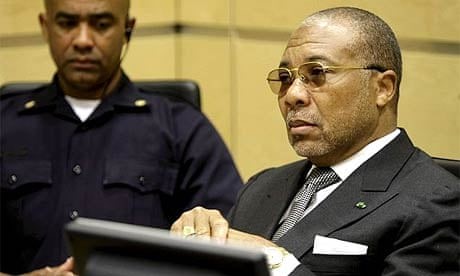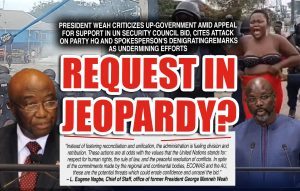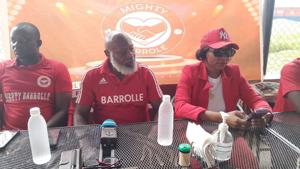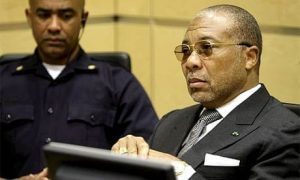Liberia: A Decade Since the Sierra Leonean Court, Experts Point to Cheaper, “Right-Sized” Models

Charles Taylor during his trial in The Hague. Photograph: Michael Kooren/EPA
The team designing Liberia’s courts have a range of former courts to learn from. The most obvious one is Sierra Leone’s Special Court – held in our neighboring country to try crimes that resulted as a spillover from our own conflict. The Special Court, established in an agreement between the United Nations and the Sierra Leonean government, convicted twelve perpetrators, including former Liberian president Charles Taylor, in a process that ran three times longer than planned, at cost, of more than $US300 million.
By Anthony Stephens and Prue Clarke with New Narratives
The court’s ruling in April 2012 found Mr. Taylor guilty of five counts of crimes against humanity, five counts of war crimes and one count of other serious violations of international humanitarian law perpetrated by Sierra Leone’s Revolutionary United Front (RUF) rebels, of which he was the major backer. Because of fears for security in Sierra Leone, Mr. Taylor was tried in The Hague in the Netherlands.
Since the Special Court for Sierra Leone ended its operations, there has been a sea change on transitional justice in Africa. Numerous accused perpetrators have been tried for serious human rights violations and international crimes in a range of smaller, cheaper courts that experts say are better models for Liberia. International donors have repeatedly urged Liberian officials and advocates to lower expectations for funding.
Off the record donors say there is no way Liberia – with an annual government budget of less than $800m and massive needs in areas like health, water and sanitation and education – is going to get the hundreds of millions of dollars that some officials are expecting for the courts.
In her recent appearance at a UN meeting in August, Beth Van Schaack, the current US Ambassador-at-Large for Global Criminal Justice, pointed to ongoing the Special Criminal Court for the Central African Republic and the Extraordinary African Chambers in Senegal, which tried and convicted Chadian dictator, Hissene Habre in 2016.
“Both made significant achievements with smaller budgets,” said Ambassador Van Schaack. “The future Liberian court could be embedded within the Liberian national system, but still benefit from international support in the form of judges, prosecutors, defense counsels and other staff, as well as technical assistance and consistent financial support, while otherwise remaining right-sized for the Liberian context.”
U.S. Ambassador-at-Large for Global Criminal Justice, Beth Van Schaack at a U.N. gathering on Liberia’s transitional justice process in August.
The Central African Special Criminal Court began operations in 2018 to try those accused of serious international crimes in conflicts starting in 2003. The first trial did not get underway until 2022. The court has a mandate of five years, which can be renewed only once, for a maximum of 10 years. The court is integrated into the Central African Republic’s domestic judicial system. It is a so-called “hybrid” court, meaning it is staffed by a mix of international and Central African judges, prosecutors and administrators.
So far the Court has convicted three perpetrators. Twenty-two have been indicted with more investigations underway. The court operates on an annual budget of approximately $US14-15 million – mostly provided by international donors including France, the Netherlands, the European Union, the United States and UN agencies.
The SCC’s investigation process – consistent with the Central African Republic’s civil law legal system adopted from French colonizers – provides for two possible phases of investigation. The first is conducted by the prosecutor’s office, to be completed within a six-month period, unless the judges approve an extension. The second is by a two-judge panel consisting of one national judge and one international judge, whose investigation can last up to two years. The investigating judges seek additional evidence and undertake their own investigation, and then decide whether the case should be brought to trial or dismissed. The investigating judges can also initiate their own investigations based on a complaint from an individual (a victim or family member) rather than wait for cases to be referred by the prosecutor.
A team of 20 domestic police officers conducts investigations, directed by the prosecutors and investigating judges. These officers do not necessarily have experience investigating the types of complex cases under the SCC’s mandate, so the UN has given them training and access to expert advice.
A screenshot of a video link as a victim testifies at the trial of Hissène Habré. The former dictator is in white robes.
Habre’s 2016 trial and conviction was made possible through an agreement between the Senegalese government and the African Union. It also broke ground in many important ways. It was the first time that an African defendant was convicted of war crimes on African soil. It was also a hybrid mix of local and international judges and lawyers. It was established in the courts of Senegal on the principle of universal jurisdiction, which says that crimes against humanity know no borders and can be tried anywhere. This is the same principle under which Alieu Kosiah, Kunti Kamara and Gibril Massaquoi were tried in European courts for crimes committed in Liberia’s civil conflicts. (Mr. Massaquoi was acquitted while the other two were convicted.) Habre’s trial was the first time universal jurisdiction had been used on the African continent and marked an important precedent that showed other African countries can try accused perpetrators who seek to escape justice by hiding out in their territory.
The Habre trial heard from 69 victims and found the former dictator guilty of crimes against humanity, war crimes and torture committed in Chad between 1982 and 1990 when human rights activists estimate as many as 40,000 people may have died at the hands of Chad’s security forces under Habre’s command. Habre was found to have personally committed rapes. He was sentenced to life imprisonment and later died of Covid complications in 2021. His trial cost $US11 million.
The Women in Peace Building Network call for justice at the celebration of the 21st anniversary of peace commemoration. Credit: Anthony Stephens/New Narratives.
Reed Brody, a leading international human rights lawyer who represented victims in that landmark trial, said it had some important lessons for Liberia.
“The African Union was able to draft a charter for the court that included all the international crimes,” said Brody by video call. “It included the idea of command responsibility (that Habre was responsible for crimes committed by those under his command). That allowed people to come into the jurisdiction who had participated in the perpetration of the crimes – former henchmen of Habre – who were able to come to Senegal and testify without worrying, if they would have been under French Senegalese law, that they would just be arrested once they admitted that they had participated.”
Experts Say Numerous Challenges Will Likely Be Faced By Liberia Too
The Central African Republic court has had to overcome numerous challenges, many of which will likely arise in Liberia too. Many of the suspects escaped into hiding in the country or abroad. At least one government official used his political clout to win release from detention.
As a coalition of experts gets to work on plans for Liberia’s war and economics crimes courts, there are a large range of issues to consider. In a special series, Front Page Africa and New Narratives will look in depth at the issues. Where will the court be held? How much will it cost and who will pay? What security issues need to be considered? Who and how many people will be tried? In part 1 we look at the models court planners will draw on.
There was no separate detention facility for court detainees, so they were put into the general prison system which, like Liberia’s, is severely overcrowded and has been criticized by human rights advocates for deplorable conditions.
Hiring and retention of international staff was particularly difficult, including because they were nominated and paid for by their own governments, according to Human Rights Watch. Many parts of the court were not properly staffed for years.
While training in international law was provided for local lawyers, a system of legal representation was not formally established until three years after operations began, meaning defendants, witnesses and victims did not have trained representatives.
The Covid-19 pandemic saw investigations grind to a halt. Given the court’s 5-year mandate (renewable once) this has increased pressure on staff to move fast. Public health emergencies requiring lockdowns – Liberia has experienced two in the last decade – will seriously impact the Liberian courts’ operations.
The next stories in this series will look at issues including security, staffing, location and funding for the courts. Contact@newnarratives.org
This story is a collaboration with New Narratives as part of the West Africa Justice Reporting Project. Funding was provided by the Swedish Embassy in Liberia. The funder had no say in the story’s content.
The post Liberia: A Decade Since the Sierra Leonean Court, Experts Point to Cheaper, “Right-Sized” Models appeared first on FrontPageAfrica.




